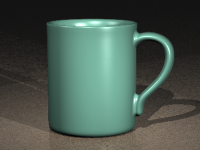
Render the model using the current renderer producing a color image in a separate display window.
The process needed to render scenes consists of four basic steps:
| ● | Add lighting |
| ● | Assign materials |
| ● | Set up the environment |
| ● | Render
|
Although the steps do not have to be done in this order, using this method seems to make setting up a scene more efficient. To improve quality, repeat these steps until the image looks right to you.
Assign materials to layers
| 1. | In the Layers dialog box, select one or more layer names, and click in the Material column. |
| 2. | In the Layer Material dialog box, set up material properties. |
Assign materials to objects
| 1. | Select an object. |
| 2. | On the Edit menu, click Object Properties. |
| 3. | In the Properties panel, on the Material page, set up material properties. |
Set up lighting
Add spotlights or other lights.
Set up the rendering environment
The rendering properties include environment settings like background color and image.
| 1. | Open the Environment Editor. |
| 2. | Set up environment properties. |
Turn on a ground plane
| 1. | Open the Ground Plane panel. |
| 2. | Set up ground plane properties. |
Render and save
| 1. | On the Render menu, click Render. |
| 2. | In the Render Window, on the File menu, click Save As. |
Open the Lights panel.
Background color, image, projection.
Assignment, color, bump, environment map, name, texture, transparency.
Change an object's material color to match its object or layer display color.
![]() Rendered viewport display mode
Rendered viewport display mode
Shade objects with a simulation of the rendered view.
Render the view in the render window with a with a rough quality for a fast preview.
Render a selected area in the viewport with a rough quality for a fast preview.
Render a selected area in the render window at viewport resolution.
Render a selected area in the render window with a rough quality for a fast preview.
Display the render mesh for selected objects.
Hide the render mesh displayed with the ShowRenderMesh command.
Open the Content Filter dialog box.
Render the objects using the current renderer.
Render a selected area in the viewport at viewport resolution.
Render a selected area in the render window at viewport resolution.
Specify a rendering plug-in.
See also
Rhinoceros 5 © 2010-2015 Robert McNeel & Associates. 17-Sep-2015